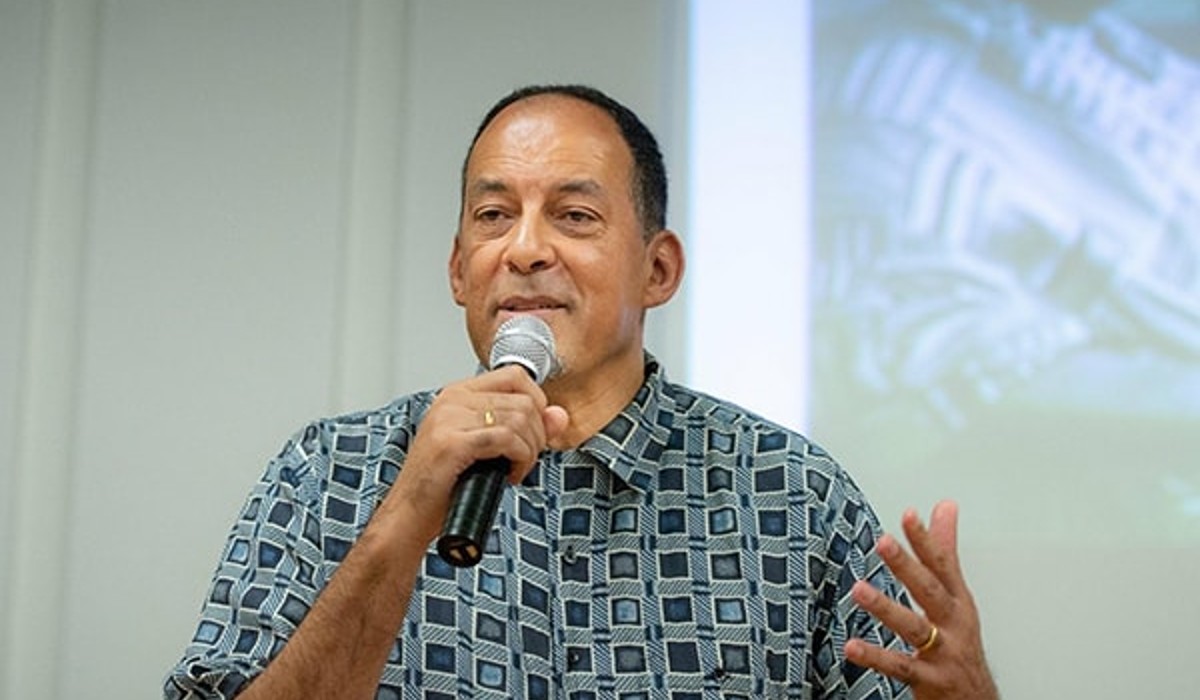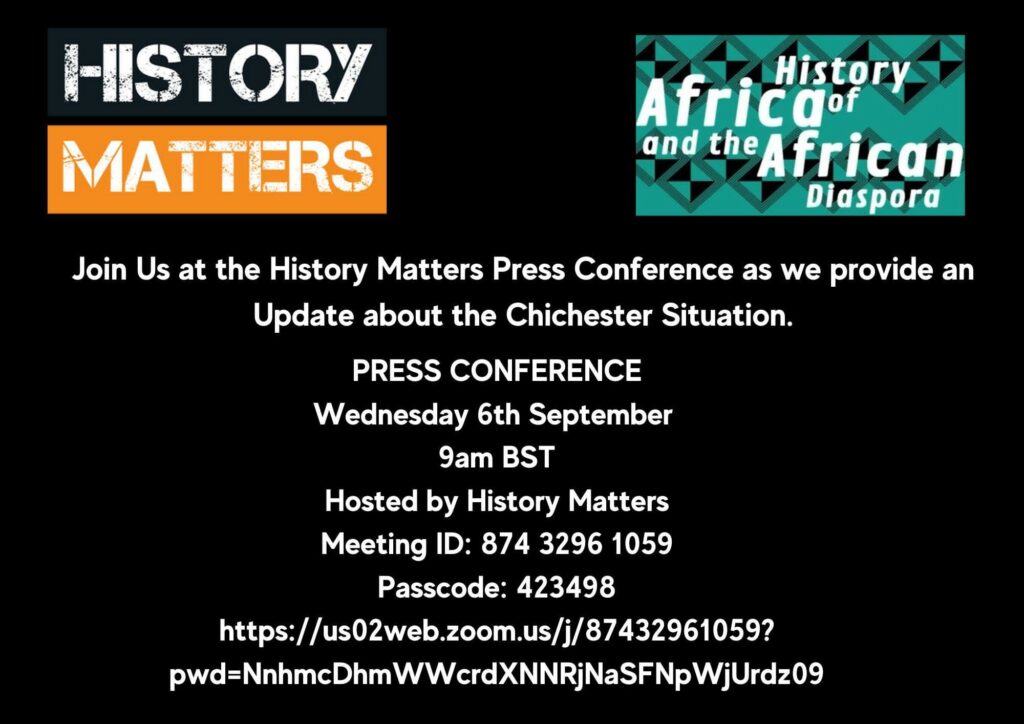 Hakim Adi
Hakim Adi
Kate Connelly talked to Professor Hakim Adi about the closing of the only degree course in Europe focussing on African History
The University of Chichester are scrapping a unique Masters by research (MRes) course on the history of Africa and the African diaspora. They have sacked you, the first History professor in Britain of African heritage, leaving your students in the lurch. And they have sacked your colleague Dr Dion Georgiou. What’s behind these moves?
It’s a very good question, that’s what everybody asks. It’s very difficult to explain. I can tell you what the university says it’s about but that doesn’t make much sense either.
The university’s position appears to be that the MRes didn’t recruit enough students over a 5-year period and therefore it should be closed. That’s the first thing. And then, they then use that fact to say that I should be sacked. That’s quite curious because university courses close all the time and it doesn’t necessarily lead to anyone being made redundant.
As well as teaching on the MRes I also supervise 10 PhD students and previously I’ve taught undergraduate modules and so on, so linking my employment simply to one Masters programme is a bit peculiar.
The Vice Chancellor of the university gets paid three times as much as I do and if you take the salaries of the six senior managers, that comes to an enormous amount of money. You could save three times as much by getting rid of one of them, as you could by getting rid of one of me. So that’s all a bit odd.
You could say, well if the course doesn’t recruit enough students surely what’s necessary is to promote it more widely. And that’s what’s been said to the university over the past 5 years all the time.
It’s a specific course with a specific target audience. It’s designed to address an imbalance which exists in academia in Britain which is that not very many people of African and Caribbean heritage study history. If you want to redress that imbalance it’s not something you can do just over a couple of years, you have to stick with it and develop it. So from that point of view as well it’s rather strange that the university have taken the action that they’ve taken.
They say it’s simply a question of low recruitment. But we recruited students twice a year for the last five years. We’ve produced seven PhD students in that time, six of them at the university of Chichester, five of them still at the university of Chichester. So you’d think that was quite successful. Never in those five years has anybody come to me or written to me and said you’re not recruiting enough students, or what the target number is, that was only said from May of this year.
That’s very short notice.
In May I was simply told that the MRes was being suspended pending further investigation. I wasn’t told I was being made redundant then, but it became obvious that that was what was going on. I wasn’t told until July, so they left me dangling for six weeks or so, in fact while I was on annual leave. It’s not the best way to spend your annual leave: being fairly sure that you’re going to lose your job but nobody actually telling you.
The marketisation of education has facilitated these kinds of ideological attacks. What will be the results if this is allowed to go ahead?
You could say it’s due to the general underfunding of education, gearing education more and more to the needs not of people but the needs of big business. And also to the notions as expressed by various government ministers that some degrees are not very important.
At Chichester we have 16 black postgraduate history students. That’s probably the biggest cohort of postgraduate history students of African and Caribbean heritage in the country, in a university which is overwhelmingly monocultural.
We developed that over many years and within a couple of months it’s been completely demolished.
We created a course which responded to community demand. The MRes idea really arose out of the History Matters conference that we held in 2015 to discuss why there were so few young people of African and Caribbean heritage studying history in this country and so few history teachers with that origin in this country. For young black people history was the third most unpopular subject (with only agriculture and veterinary science being more unpopular). And this in a society where you go into any community setting and you will find heritage walls and projects and people discussing historical matters.
There was a mismatch we were concerned to investigate and find answers to.
One of the proposals at that conference was to have a course which could encourage people to come back into education: mature students who loved history but who had been put off by the Eurocentric focus that often exists in academia and in schools.
The MRes was set up with that aim. It was completely online so people could go to work and still come on the course, they could be anywhere in the country or anywhere in the world. They didn’t even need to necessarily have a degree.
We’ve also produced the PhD students who are going on to do research. One of our graduates has just got her PhD, she’s got a book contract, her book’s coming out soon.
These are things that the university seems to have forgotten about.
All of that will go: that access to higher education and to historical research is gone.
And now in Britain there are no degree courses which focus on the history of Africa or the African diaspora – there’s nothing. In fact, in Europe there’s nothing. So that’s a big problem.
I see the university put out a statement saying only one student had graduated from the MRes. Well they obviously don’t even know anything about their own students because they have five PhD students who all graduated from the MRes. That’s what we’ve produced.
Now those students have lost their supervisor. The university has no suitable person, no specialist in the history of Africa and the African diaspora, to supervise those students. They’ve alienated all of those students.
A couple of weeks ago in the preparations for my redundancy, I was asked if I could crowdfund to raise money for my post. What other professor would expect to be spoken to in that manner? It just shows complete, absolute contempt.
There’s also the impact it’s had on potential students who are being denied this opportunity. We also have students who deferred their studies from last year who’ve now returned to the university saying where’s this MRes, and the university’s saying oh well we’ve abolished it. No consideration, no consultation with the students. If I hadn’t told the students what was going on it would have been a complete secret.
What’s the response been like?
The fact that we had 12,000 people sign a petition from all over the world gives you some idea of the impact that it’s had and the concerns that people have about this particular university.
But it also reflects what people think about higher education in general in this country, that there is no other course, there is no other avenue for people to take. And I think that’s also very strongly reflected in the comments that people have made in support of the struggle and campaign that we’ve been waging.
All the current students are being very, very active. They are the ones who first suggested a petition. They got together and have stayed together and worked together. So that’s been good for us and good for them, that there is that unity and solidarity.
There have been some students, particularly former students who have seen things on Twitter, students who’ve just graduated from the university, obviously my former students who’ve been very supportive and some of them are actively engaged in the campaign themselves, including students in other countries.
And now we need to convert that sympathy into money. If everyone who signed the petition can give £5 we’ll be in a very good position in terms of the legal campaign.
What can we do?
There are two things: one is to hold the university to account. We cannot have a unique course which had done so much, and which could have done so much more, just trashed as if it means nothing. It is an attack on the history we’re researching and writing about. We cannot have that. I’ve mentioned insulting people by asking them to Crowdfund for their posts. We cannot allow that to stand, that’s not acceptable.
The university needs to be held to account and that will principally be done by taking various forms of legal action. The students are taking their own action and are fundraising for that purpose. We need to raise that money. If everyone who reads this article can give something, that’d be very, very helpful and we call on people to do that.
The second problem that we have is that the 16 students are unsupervised and will be unsupervised because there’s nobody suitable to supervise them. We need a new home. If anyone’s got a university, that needs a professor and 16 students, wants to change its demographics, then we’d like to hear from them!
It’s quite urgent because people are in the middle of their PhDs, or coming to the end of their MRes.
I certainly want to continue the work that has been undermined and disrupted by the actions of the University of Chichester.
We want to continue that, the students want to continue studying, we think it’s very important, we think the history that we’re all studying which relates to Africa and the African diaspora – some people focussing on Britain, some on Africa, some on the Caribbean, some on the US – we see this as one history and we think it’s very important to develop that work.
Support the campaign. Donate to the Save the MRes Defence Fund. Keep up to date with the campaign at History Matters. Pass a resolution to support the Fund and the campaign in your union branch. Join the History Matters press conference on Wednesday

Before you go
Counterfire is growing faster than ever before
We need to raise £20,000 as we are having to expand operations. We are moving to a bigger, better central office, upping our print run and distribution, buying a new printer, new computers and employing more staff.

